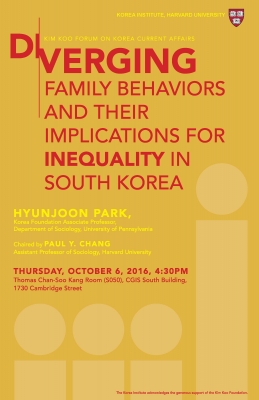
김구포럼
김구포럼입니다.
| 제목 | [하바드대학교]김구포럼 2016 Fall-1 | ||
|---|---|---|---|
| 작성자 | admin | 작성일 | 2016-10-11 |
|
“Diverging Family Behaviors and Their Implications for Inequality in
Kim Koo Forum on Korea Current Affairs Date: October 6, 2016 - 4:30pm - 6:00pm Location:
Hyunjoon Park Hyunjoon Park is Korea Foundation Associate Professor of Sociology and Education at the University of Pennsylvania. He received his Ph.D in Sociology from the University of Wisconsin-Madison in 2005. Park is interested in educational stratification and family in cross-national comparative perspective, focusing on South Korea and other East Asian societies. In recent years, he has studied consequences of rapid family changes for children’s well-being in societies which have weak public welfare systems and conservative family norms. Park has published a single-authored book, Re-Evaluating Education in Japan and Korea: De-mystifying Stereotypes (2013 Routledge) and coedited a book, Korean Education in Changing Economic and Demographic Contexts (with Kyung-Keun Kim, 2014 Springer) and a previous volume (Vol. 17) of Research in the Sociology of Education (Globalization, Changing Demographics, and Educational Challenges in East Asia with Emily Hannum and Yuko Butler, 2010). Park is the coeditor of the annual series, Research in the Sociology of Education (with Grace Kao). Chaired by Paul Y. Chang, Assistant Professor of Sociology, Harvard University
Abstract During the last few decades, South Korea has experienced dramatic changes in major family behaviors, which are often more pronounced than corresponding trends in the West. By comparing the trends in three family behaviors ? marriage, divorce, and living arrangements, at the bottom and top of socioeconomic hierarchy, this study demonstrates that rapid changes in family behaviors have not been uniform across social class. Instead, Korea has seen growing class divide in marriage and divorce, particularly due to the plummeting marriage rate and soaring divorce rate among the low educated. Meanwhile, the more educated are more likely to live with their family members than the less educated. This study concludes with implications of growing polarization of family behaviors for inequality in the next generation.
|
|||






